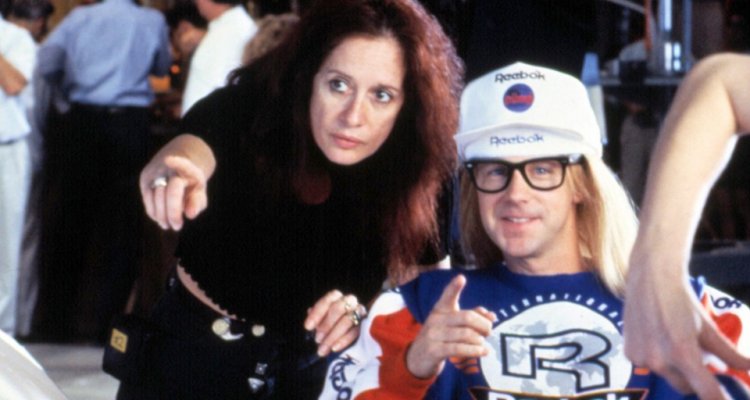If you’re a film fan that’s under the age of 30, there’s a large chance you’re not familiar with the work of filmmaker Penelope Spheeris. And frankly, that’s a damn shame. While many know her for her work on films like “Wayne’s World,” “Little Rascals,” and “Black Sheep,” the director revolutionized how punk rock was portrayed in cinema thanks to her films “The Decline of Western Civilization” (which would go on to have two respected sequels) and “Suburbia” (a cult film that was recently restored and deserves wider recognition). Needless to say, if Hollywood had punk rock royalty, Spheeris would be up there. And in a new interview with AV Club, the filmmaker shows just how punk she is, as she explains why she left Hollywood behind.
Right off the bat, it’s important to note that Spheeris isn’t lying when she says she said goodbye to filmmaking. Her last feature film was released in 2011, and her last film of any kind is the TV production of “The Real St. Nick” in 2012. Since then, she’s been M.I.A., and as you hear her describe it, it appears she left for all the right reasons (as screwed up as they were at the time).
She starts by describing the moment she realized that her time in Hollywood would be coming to an end, on her own terms.
“That would be working with the Weinsteins,” explained Spheeris. “I have done a lot of different kinds of genres and a lot of different types of subject matter, but I did those because I just took whatever job I could get. Because as a woman in the film business, you really don’t get to pick and choose.”
She continued, “But working with the Weinsteins was probably the moment where I said to myself, ‘How the fuck did I get here? What am I doing?’ I did a movie called ‘Senseless’ with David Spade and Marlon Wayans with the Weinsteins producing back in 1998. I was just finishing this movie and I said, ‘I don’t want to do this anymore. I don’t want to work in this movie business anymore.’ And as a matter of fact, that was that.”
But you see, it wasn’t some sexual misconduct claim or inappropriate behavior (for which the Weinsteins are infamously known for nowadays) that led the filmmaker to this conclusion. It was the abuse of power in another way that created the tension.
“But they kept rewriting [‘Senseless’], and it’s in my contract that I got to do what they say, you know?” she explained. “And at one point, I said to Bob Weinstein, ‘I don’t think this works,’ and he goes, ‘This is my fucking money and I’m going to spend it any fucking way I want to.’ And how are you going to argue with that?”
“So I had to do the movie, and it didn’t do very well,” she added. “And as a woman, when you do a movie that doesn’t do well, then you’re done. You’re in director jail.”
We have talked before about the idea of “director jail,” and for those that don’t know, there are certain filmmakers (normally minority filmmakers or women) that can be left behind after a studio invests money in their work and they don’t recoup it at the box office. This means the directors are left to find work wherever they can, and are, for all intents and purposes, blacklisted from major studio films.
From that experience, Spheeris saw that the studio system was changing, and for the worse.
“It changed into something that I didn’t want to be a part of,” she said. “I really didn’t want to be a part of mainstream Hollywood anymore. It was too—it’s ugly. You have no friends in Hollywood. Hollywood is a lonely, lonely desert, especially as a woman.”
She continued to explain the double-standard that exists in Hollywood between the way male filmmakers are treated versus their female counterparts.
“There’s no forgiveness,” the director explained. “Oliver Stone could go wreck a car and get arrested for being on drugs and then do ‘Alexander.’ But we can’t do that. Women can’t make mistakes. I’m not driving home tonight because I had a couple beers, you know? [Laughs.]”
She added, “But yeah, you can’t screw up when you’re a woman. One little mistake, and you’re done.”
So, with these words, it sure doesn’t sound like Spheeris has any interest coming back to Hollywood, even though it would seem that the politics of filmmaking are changing, with more and more women getting opportunities. No, the filmmaker is perfectly find being on the outside.
She said, “At this point, I don’t want to make a movie. They can’t even fucking beg me to make a movie.”

